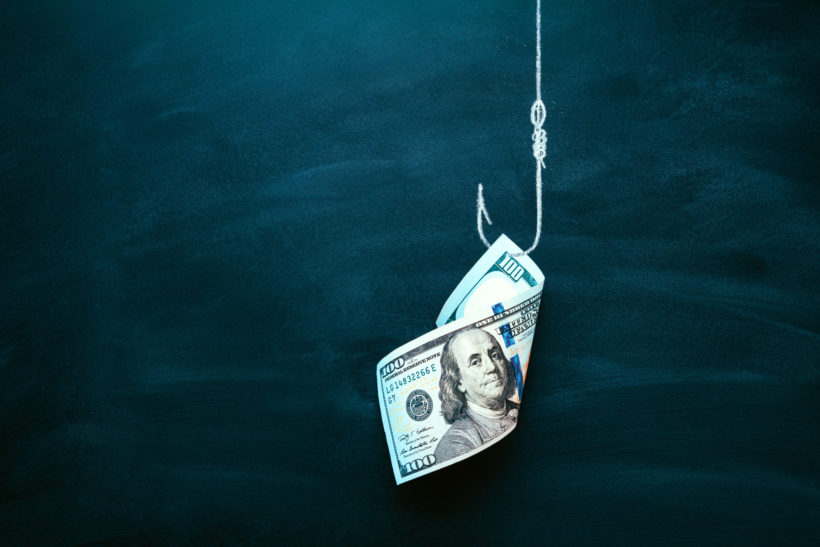
A business owner looking for a deposit for a building he wanted to purchase says he wound up losing $1,200 to a loan scammer, according to a complaint filed on the Better Business Bureau website. He’s not the only entrepreneur who has reported being ripped off while trying to find financing.
The “BBB Scam Tracker is seeing an increase in scammers masquerading as legitimate loan providers,” warns Paula Fleming, Chief Marketing and Sales Officer with the Better Business Bureau. Small business owners are the latest target of the long-running advance fee loan scam.
In the case of the business owner who filed the BBB complaint, he was contacted by a company with a name similar to a legitimate lender. He was told he needed to pay $1,200 for insurance for the loan. He paid it, but the loan did not come through. Instead, the alleged scammer demanded even more money.
It’s understandable that overwhelmed and busy business owners may fall prey to loan scams. Getting a small business loan can be confusing. There are thousands of small business lenders in the U.S. and it can be difficult for the average business owner to understand which ones are legitimate.
It’s especially challenging if you don’t meet small business lenders requirements, which often involve good credit (personal credit and/or business credit), strong business revenues and at least 1-2 years in business.
But the moment someone asks for money upfront, you should be on high alert. The BBB explains:
“Real lenders never guarantee a loan in advance. They will check your credit score and other documents before providing an interest rate and/or loan amount and will not ask you to pay an upfront fee. Fees are never paid via Green Dot MoneyPaks, iTunes cards, or wiring money. Unusual payment methods and payments to an individual are a big tip off.”
Watch for warning signs
If you’re an entrepreneur who doesn’t have good credit or a strong business track record, you are especially susceptible and may find yourself dropping your guard. Before you consider a “too good to be true” loan offer, here are a few key things to look out for:
- Be extremely careful about requests for money before you get the loan. Some loans do require key person insurance or other insurance as a condition of the loan, but when they do, you’ll be able to get that insurance through your own insurance provider.
- Be very wary of lenders who make it sound like you can get a loan even though you’ve been rejected everywhere else.
- Don’t pay a lender through questionable payment methods such as iTunes cards or prepaid debit cards you pick up at a local store.
- Verify that you’re talking to the lender. Some scammers use the name of reputable lenders to contact prospects. It’s always best to verify your relationship with the lender before you provide sensitive information. If you receive a financing offer by email, check the email’s return address to make sure it’s not a phishing scam trying to take you to a fake website.
- Check websites to make sure they are secure before you upload sensitive information. Look for that padlock in the upper right corner of the URL and watch out for newly registered websites, or those without verifiable contact information.
- Read reviews and check with online sources, such as the Better Business Bureau or your state attorney general. (In some states, small business lenders must be licensed.)
Where to find financing
If you’re running into roadblocks getting financing because your business isn’t making a lot of money, you may need to look at startup funding options that don’t require strong business revenues. If you’re just starting out (or sales have slumped), you may want to look into any of the following options:
- Crowdfunding. You may be able to raise money for a solid idea, even before you’ve sold your product.
- Business credit cards. You may qualify based on your personal income and not just business income. Some cards offer 0% financing for a year or longer.
- Microloans from CDFIs (Community Development Financial Institutions). These community lenders (often nonprofit) may offer small startup loans, or information about grants.
- Vendor credit. Vendors offering supplies you need for your business may be willing to let you buy now and pay later from cash flow.
Related: 5 Tips for Keeping Your Business Credit Strong During Turbulent Times
If you have poor credit, you can consider financing options that are more flexible when it comes to credit score requirements. Those may include:
- Crowdfunding.
- Microloans from CDFIs or nonprofit lenders.
- Vendor credit.
- Equipment financing.
Friends and family may also be willing to help with the funds you need to start your business. It may not be your first choice, but it does happen to be one of the top sources of financing for startups. If you’re considering asking those you know for financial help, you may be able to increase their impact by asking them to participate in your crowdfunding campaign.
Above all, don’t ignore your gut if you feel something is off. If you fall for a loan scam, it’s likely you won’t get your money back, and that puts you even further behind when it comes to fulfilling your dream of growing a successful business.
Verizon Small Business Digital Ready: A free resource for learning basic business skills, the latest digital technology and more.
The post Don’t Fall For This Small Business Loan Scam appeared first on StartupNation.
via https://www.AiUpNow.com
November 10, 2021 at 12:02AM by Gerri Detweiler, Khareem Sudlow
